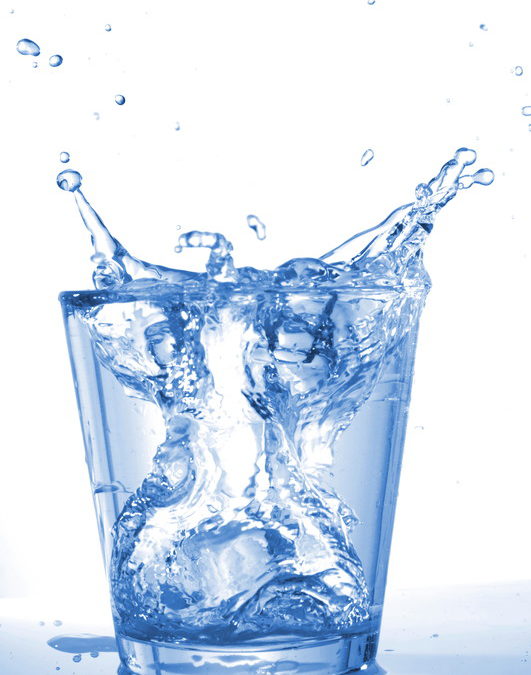Did you know that the average human body is between 50-65 % water?
The average percentage of water in infants is much higher at about 75% and decreases as they grow.
There are many differing opinions on water. Everyone is different and has different needs.
Water is needed for many functions in the human body and particularly important for thermoregulation. The European Food Safety Authority recommends that adequate total water intake for women is 2 litres a day and for men it is 2.5 litres a day.
How much you need depends on your size, physical activity, the food you eat and the climate you live in. If you are on a raw food diet, you will need less water than someone who does not eat hydrating foods. If you work out in the sun all day long, you will certainly need more water than someone who works in an office. If you exercise and sweat more you will need more water.
Soft drinks, coffee, tea, etc are NOT water so don’t count that can of soda as one of your eight glasses of water, it may actually increase your need for water.
If you are thirsty, it probably means you have waited too long and you are dehydrated. So, drink before you are thirsty.
Your urine is a great indicator of whether you need more water, clear is good, cloudy means you need more water. Knowing how much water you need is pretty easy. It is selecting the type of water to drink that gets a little tricky.
Water choices:
Tap water
Comes out of the faucets and has been treated and disinfected. It is purified with chlorine and has added fluoride. Chlorine is added to water to kill bacteria or viruses that can be found in water. Fluoride is added to water to reduce tooth decay.
Water filter pitcher
These are convenient to use at home, inexpensive and do not require any installation. Depending on the filter pitcher used, it will reduce chlorine, organic impurities, carbonated hardness, pesticides, etc. If buying a water filter compare the different brands to check what
impurities are removed and ensure the jug is BPA free.
Distilled water
Vaporized and collected, most of the minerals are taken out of distilled water. Do read the label to check what the source of the distilled water is.
Bottled water
The quality of the water depends on the source of the water, what it’s treated with and the minerals it contains. Although bottled water is very handy, there is a lot of concern about BPA’s in plastic bottles, especially in bottles that have been in the heat. Also, do consider whether the bottles you buy can be recycled once you have used them.
Reverse osmosis
This is water that is forced through filters that removes larger particles, pollutants and minerals. The quality of the water depends on the filters used. One of the drawbacks is there is some water wasted.
Spring water
Clean, natural and pure and is full of minerals as it comes from the rocky reservoirs below the earth’s surface. This is bottled either at source or at a plant nearby and is more expensive than other brands of bottled water that use tap water as their source.
Alkaline Water:
There is much debate about alkaline water, which helps to bring the pH of your body to neutral. This water has a pH greater than 7 and is made alkaline using an ionizer. Adding a slice of lemon or lemon juice to your water also makes it alkaline and is a great way to start the day. However, if this effects your tooth enamel use a straw to drink the lemon water.
While there is much debate on what is and isn’t the best water to drink, it is undeniable that water is a necessity of life and we should be drinking plenty of it.
